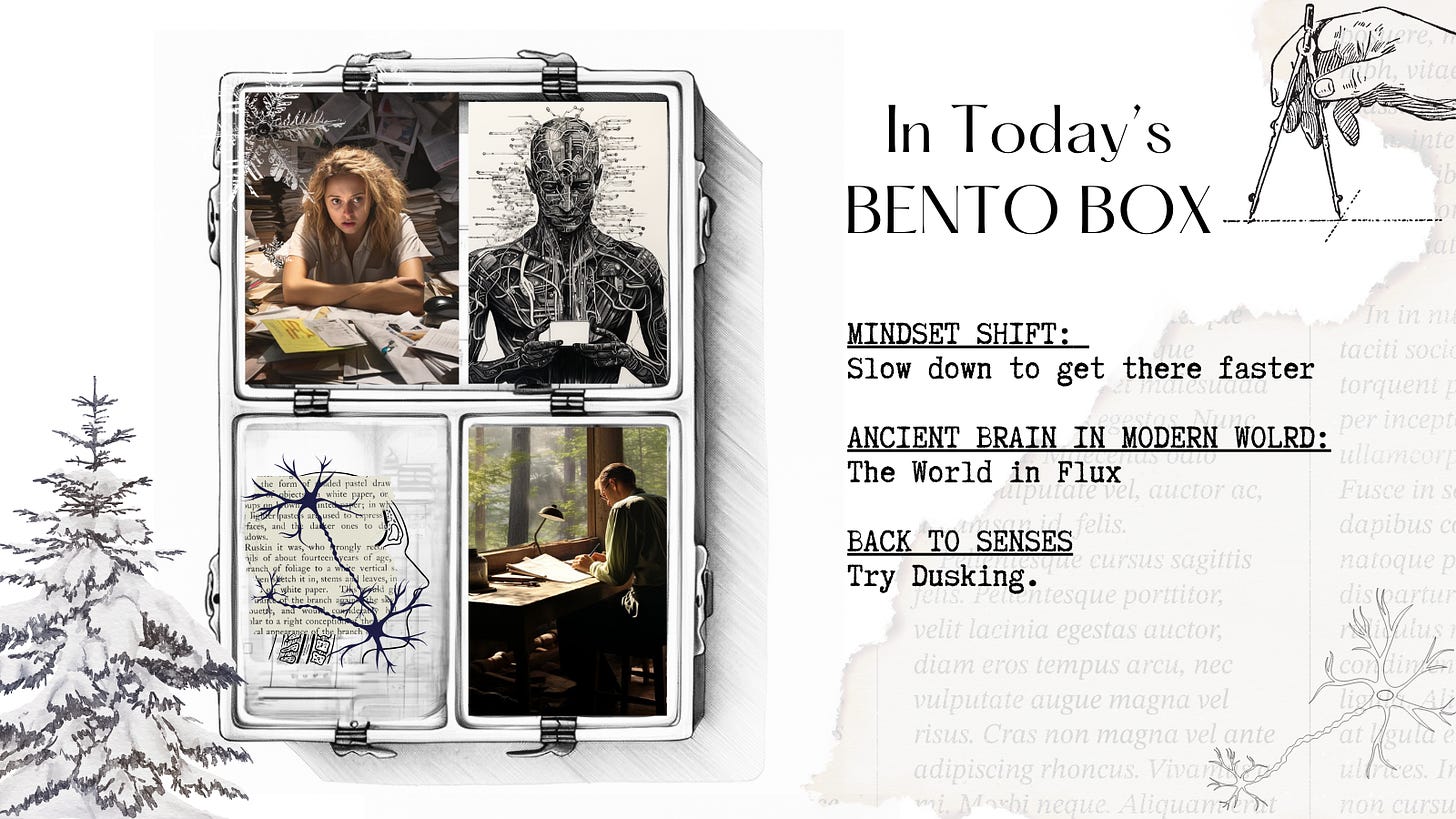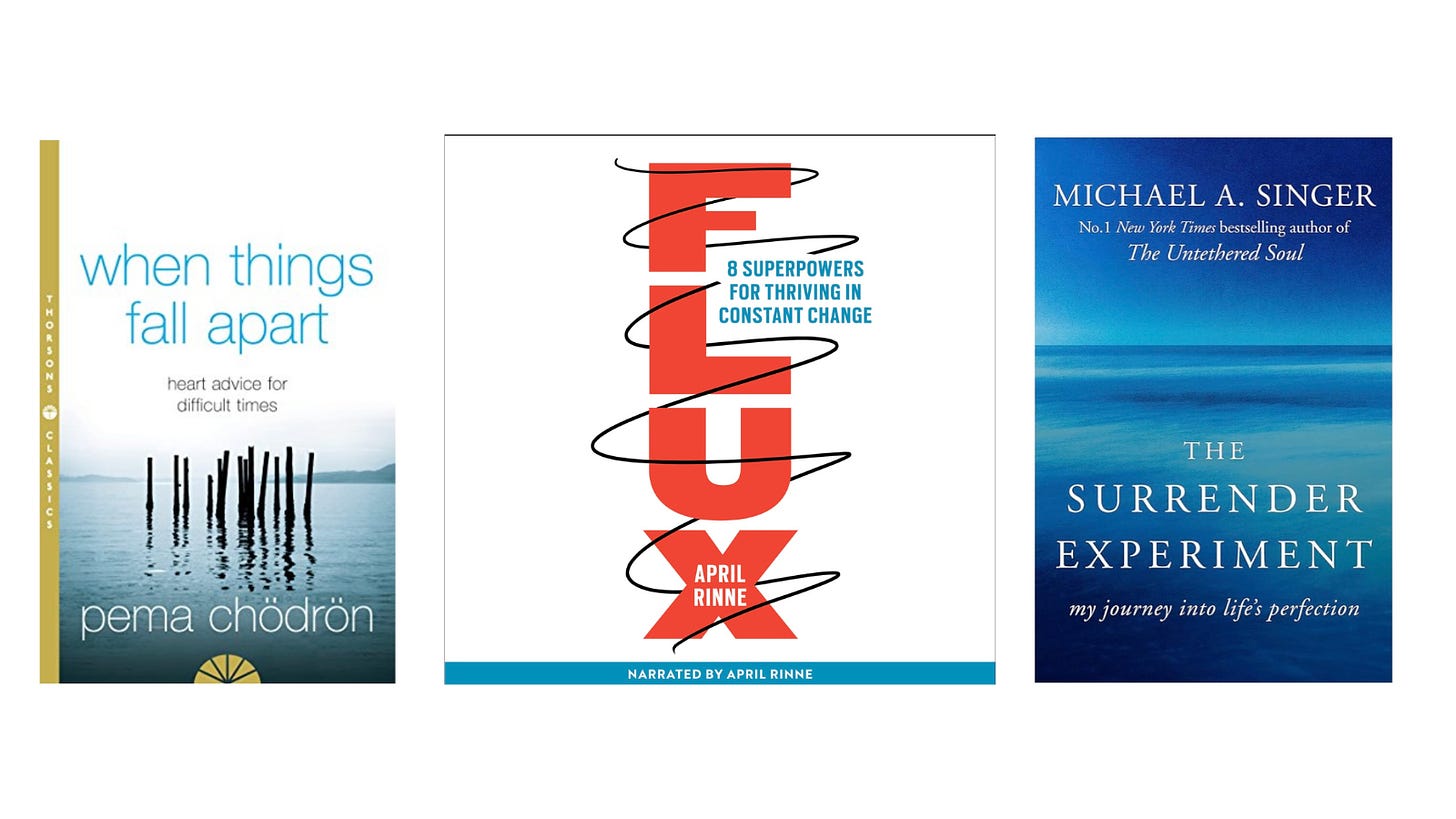Do you ever feel like no matter how much you do, there’s still plenty left undone?
Do you ever feel like you’re busy, but nothing of substance ever gets created? (If you never do, I don’t think we could be friends.)
We’re nearing the end of the year.
Some of you will try to get a lot done before the clock strikes midnight:
build and ship products
make plans
reinvent yourself
And if you know where you’re headed -that is great!
But what if you don’t?
I’d like to invite you to a Personal Sprint to Slow Down (to get ‘there’ faster).
"Beware the barrenness of a busy life." – Socrates
Embracing Uncertainty and the world of Flux.
Change is great when it’s aligned with our plans, but changed that unravels our world? That sucks.
We’re creatures of habit, clinging to our comfort zones with labels and definitions like life rafts in a sea of chaos.
In today’s explicit world, we're obsessed with defining everything: our social media profiles, our careers, our five-year plans.
Is Productivity Hurting Your Progress?
But let's be real - sometimes we confuse motion for real progress.
When uncertainty hits, and it always does, we flock to self-help gurus like moths to a flame. The internet is a buffet of 'quick-fixes' and 'life-hacks' promising control and hope.
But the map they sell you isn’t the real world.
You might snag some snazzy journaling prompts or foolproof frameworks. They look great online, but when you crack them open at home, you might feel like you got the wrong instruction for what’s in the actual box.
And so, the cycle for a better map-hunting continues.
The Trap of Oversimplifying Life
Here’s a hard truth: You need to draw your own damn map.
Life’s lessons are learned in hindsight.
Chances are, you’re not on a journey but on a quest. Maps are overrated in an uncharted territory. What you need is a compass.
Patience is key, especially when life refuses to stick to your schedule.
Slow Down.
We all want answers now, but sometimes there just isn’t enough data.
It's not about freezing all action and waiting for a divine sign. It’s about rethinking the whole 'lost' narrative. Whether it’s a personal crisis or a career change, sometimes you’ve got to wonder, wander, and get lost to find your way.
When the lights go out, don't freak out and run around like a headless chicken. Pause. At first, you won't see much, but hang in there. Your eyes will adjust, and soon, you'll start to make out shapes in the dark.
Curiosity is your best friend. Test the waters. Embrace the weird and the uncomfortable.
The Surrender Experiment.
The more you struggle, the harder it gets.
Like a quicksand, desperation sucks you deeper. When drowning in doubt, sometimes you’ve got to sink to the bottom to push yourself back up.
Surviving this limbo is tough as nails, for you and everyone around you.
The world's on your back, screaming, “Get your shit together, now!”
Life’s curveballs (a breakup, job loss, or even a pesky new social media algorithm) can send you into a tailspin. Our first reaction? Do something, anything. But haste makes waste.
That’s an easy way to get into a reactive mode when what you really need is to be creative.
The 'good idea' trap is real.
It's tempting to jump at the first solution, but sometimes, the best move is to stand still. Let your eyes adjust to the dark. Once you do, the unseen becomes visible.
Driving in a Fog
How do you drive in thick fog? Freakin' slowly.
Patience is key. When the fog lifts - and it will - you'll be ready to hit the gas and it’s all bias to action!
Navigating the Unknown
Start by admitting you’re lost.
Give yourself the luxury of time and space. Experiment without the pressure to nail it right away. You don’t have to be a genius to start, but you need to start to get there.
To navigate through this fog, dial down on:
Expectations and desires:
Fighting reality is like arguing with gravity – pointless and exhausting. If you find yourself wrestling with life as it is, ask yourself: "Is this helping or just making me miserable?"
Stress levels:
A freaked-out brain can’t think outside the box. It falls back on old habits. In times of uncertainty, self-care isn’t just nice; it’s necessary.
Impatience and frustration will show up, especially when progress feels like a unicorn. Sometimes, two steps back is the only way forward.
Trust Your Gut
Journal. Reflect. Give yourself the gift of mental space, instead of cramming it with noise. Our inner voice gets drowned out easily; it's time to turn up its volume.
Think with your gut, not just your brain.
The ‘thinking’ part of our brain can be great salesman and convince us to do different things, while our feet and hands refuse to budge. Don’t ignore it; explore it.
Just for a short time choose curiosity over practicality. Scary, I know.
X-ray The Scripts
When life falls apart, resist the urge to patch it up quickly. Maybe it's a chance to build something better, something new.
Slow the Hell Down
Slowing down can open up new paths. Maybe you need a different route, a new vehicle, maybe just a good old-fashioned walk and letting your mind do the work in the background.
Believing that “more and faster is always better” leads to:
Anxiety: "Will I ever figure this out?"
A mindset of scarcity and impatience: "I'm not doing enough."
Fear: "If this doesn't work, I'm screwed."
A cluttered mind: "Too much to do, not enough time.”
And if you still struggle with change, uncertainty or slowing down, here are three great books to read before the end of this year:
Back To Senses: DUSKING
Want to try something zero cost to put you in a more grounded state of mind? Try dusking.
Dusking is a mindful practice of observing the day-to-night transition, offering respite from hyper-productivity.
Excessive artificial light disconnects us from nature's transformative beauty. Dusking fosters a connection with nature, appreciation for twilight's nuances, and understanding of life's cycles.
Watching dusk is a form of resistance against constant productivity pressure.
Dusking is a communal tradition symbolizing the end of the day and the start of rest.
Slowing down and not relentlessly pursuing growth are vital for sustainability.
Twilight's gradual changes spark imagination and deeper world connection.
Dusking highlights the transition from light to dark and life's interconnectedness.
Reviving dusking encourages daily work-to-rest transition, fostering nature-world interconnectedness.





